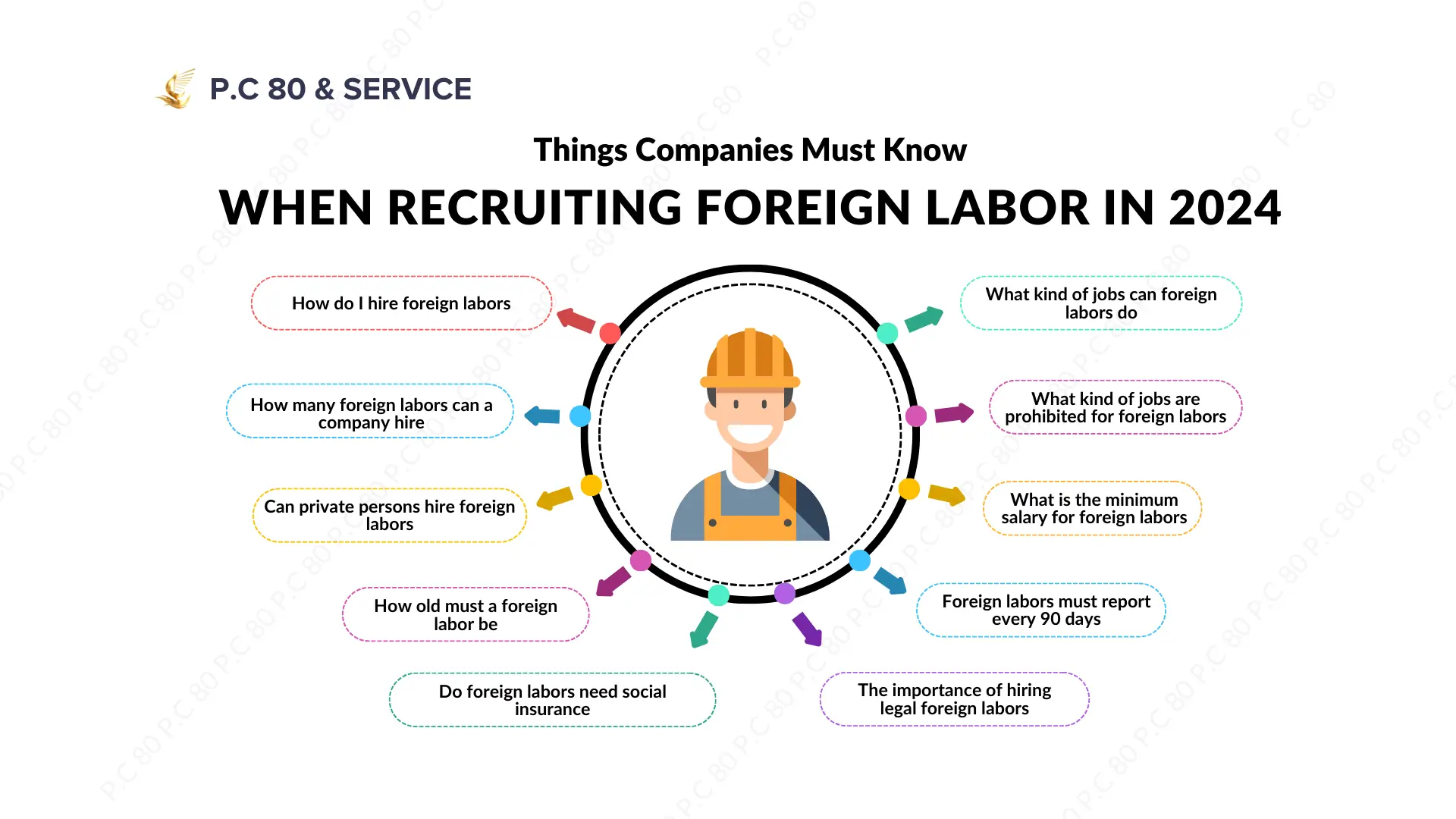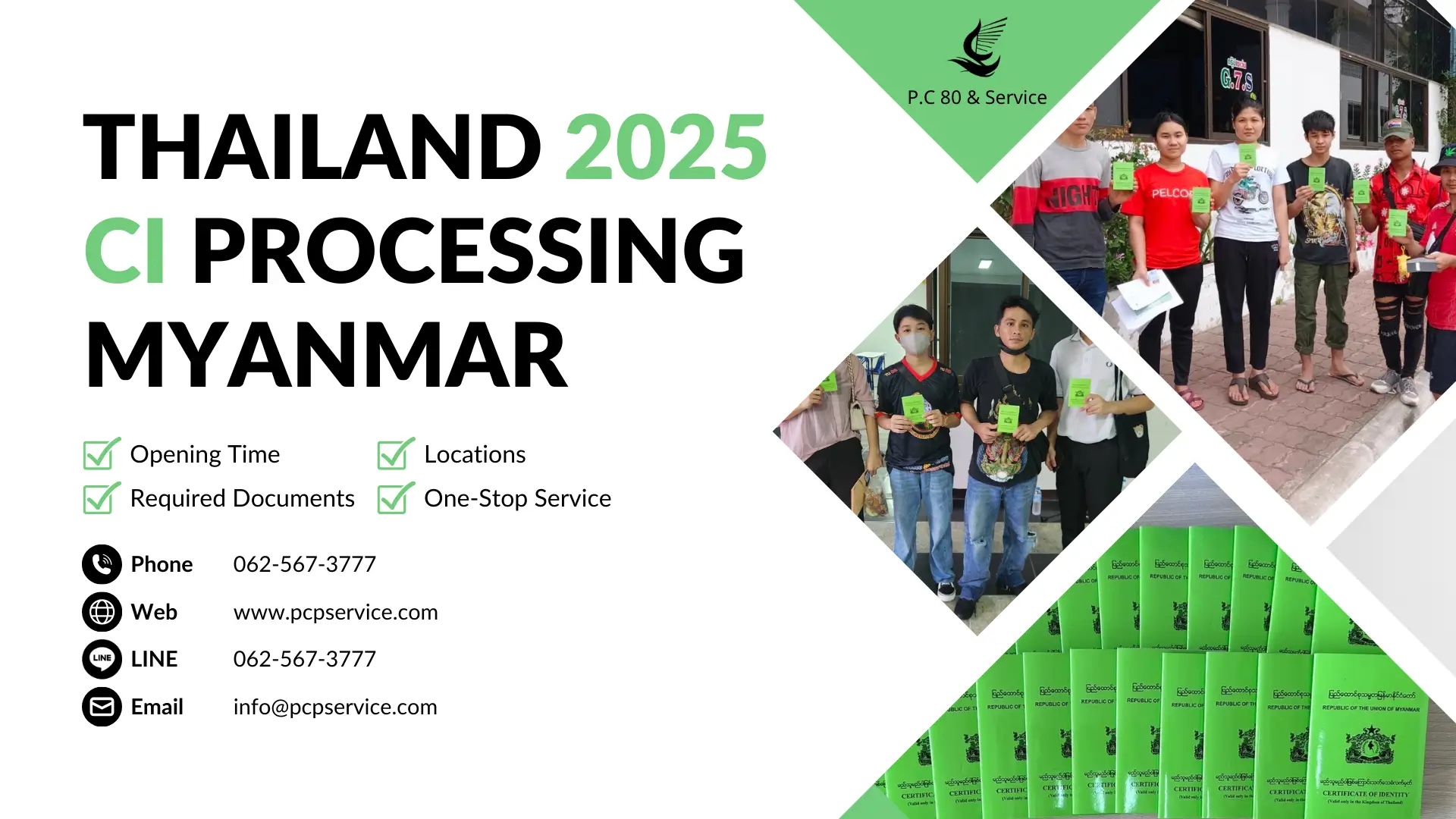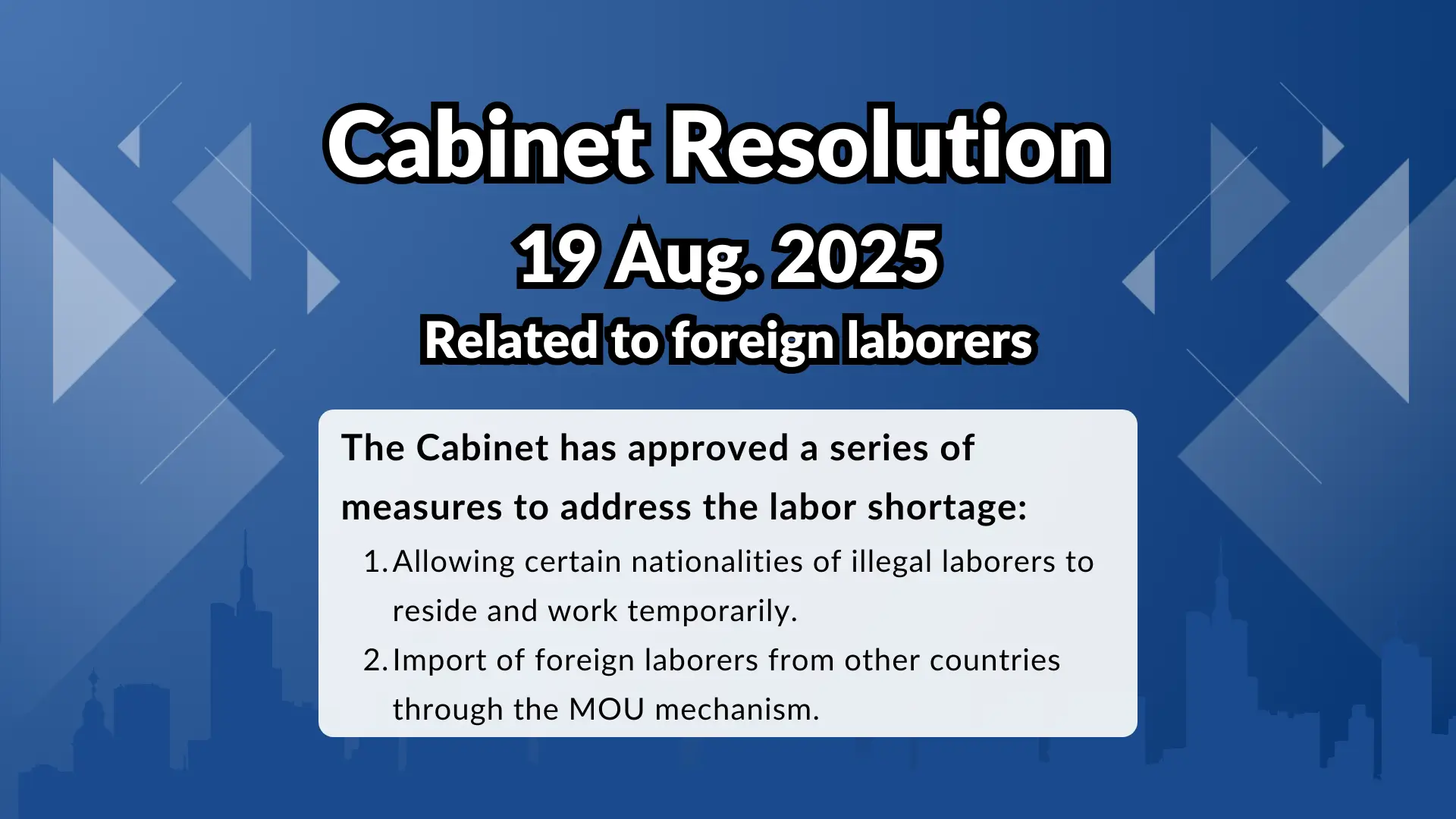Many companies want to hire foreign labors to solve the company’s labor shortage, but they don’t know how to go about it, and they don’t know much about what they need to pay attention to. This article introduces important things that companies and employers should know when hiring foreign labors.
1. How do I hire foreign labors?
- Signing a MOU with the country of origin through a formal and certified agency company to import and hire foreign labors
- Advantages: Affordable price
- Disadvantages: Time-consuming (usually 2-3 months)
- Hire foreign labors who are already in Thailand and have a work permit
- Advantages: fast(1-2 weeks)
- Disadvantages: Difficult to find a certain number of legal foreign labors at once
- If you want to hire legal foreign labors quickly, you can contact us at 062-567-3777.
2. How many foreign labors can a company hire?
There is no limit on the number of labors a company can hire
3. Can private persons hire foreign labors?
private persons can hire foreign labors
4. How old must a foreign labor be?
According to the law, foreign labors must be over 18 years old
5. Do foreign labors need social insurance?
By law, foreign labors must receive social insurance
6. What kind of jobs can foreign labors do?
In 2018, the Minister of Labor agreed at the Foreign Work Management Policy Committee meeting to define new reserved occupations, namely 12 occupations and 3 categories, for foreigners to engage in.
- Unconditional, labor type
- Must be a job with labor shortage, they can engage in 8 occupations without affecting the job opportunities of Thais, including: 1. Agriculture 2. Bricklaying, carpentry or other construction 3. Making mattresses or quilts 4. Making knives 5. Making shoes 7. Making clothes 8. Carving or making pottery.
- Conditional, according to the agreement between ASEAN countries, foreigners must obtain a professional license under Thai law to apply for a work permit for 3 occupations: 1. Accounting, 2. Civil engineering, 3. Construction profession.
7. What kind of jobs are prohibited for foreign labors?
There are 28 occupations that are strictly prohibited for foreigners
1. Wood carving 2. Hand weaving 3. Weaving mats 4. Hand making mulberry paper. 5. Making silverware 6. Making Thai musical instruments 7. Making filling machines 8. Making gold, silver or silverware. 9. Making stone machines. 10. Making Thai dolls 11. Making alms bowls 12. Hand making silk products 13. Making Buddha statues 14. Making a paper or cloth umbrella. 15. Arranging Thai letters by hand. 16. Twisting silk thread by hand 17. Driving 18. Selling things in front of a store 19. Auction 20. Diamond or gemstone cutting 21. Hair cutting, perming or beauty work 22. Brokerage or agency work, except brokerage or representative work in international trade or investment business. 23. Hand rolling cigarettes 24. Tour guide or travel organization work 25. Selling products 26. Clerk or secretary 27. Providing legal services or legal cases. 28. Thai massage is a new beauty. In this regard, foreigners working in store sales can only serve and help sell things, but cannot collect or change money on behalf of their employers, and can only temporarily guard. And the employer must be present. In the beauty salon, whether it is a barber shop or a nail salon, foreigners can only sweep and mop the floor in the store, and are strictly prohibited from cutting hair, washing hair, cutting nails, and painting nails.
8. What is the minimum salary for foreign labors?
At the beginning of 2024, the Ministry of Labor announced the adjustment of the minimum wage standard by the Wage Committee, which will be implemented in all regions across the country from January 1, 2024. Minimum wage increases vary. It depends on factors such as the economic, social and industrial scale of each province. As well as the demand for different types of labor, the labor rates are as follows:
330 Baht – Narathiwat, Yala, Pattani
338 Baht – Trang, Nan, Phayao, Phrae
340 Baht – Kamphaeng Phet, Phichit, Mahasarakham, Mae Hong Son, Ranong, Ratchaburi, Lampang, Loei, Sisaket, Satun, Sukhothai, Nong Bua Lamphu, Amnat Charoen, Udon Thani, Cheng Yat, Uthai Thani
341 Baht – Chai Nab, Chaiyaphum, Phatthalung, Sing Buri, Ang Thong
342 Baht – Kalasin, Nakhon Si Thammarat, Bueng Kan, Phetchabun, Roi Et
343 Baht – Nakhon Sawan, Yasothon, Lamphun
344 Baht – Chumphon, Phetchaburi, Surin
345 Baht – Kanchanaburi, Chanthaburi, Chiang Rai, Tak Hung, Nakhon Phanom, Buriram, Prachuap Khiri Khan, Phitsanulok, Mukdahan, Sakon Nakhon, Songkhla, Sa Kaew, Surat Thani, Ubon Ratchathani.
347 Baht – Krabi Trat Province
348 Baht – Nakhon Nayok, Suphan Buri, Nong Khai
349 Baht – Lopburi
350 Baht – Khon Kaen, Chachoengsao, Chiang Mai, Prachin Buri, Ayutthaya, Saraburi
351 Baht – Samut Songkran
352 baht – Korat
361 Baht – Chonburi, Rayong
363 Baht – Bangkok, Nakhon Pathom, Nonthaburi, Pathum Thani, Samut Prakan, Samut Sakhon
370 Baht – Phuket
As can be seen from the above minimum wage figures, the minimum wage rate of 340 baht is the wage distribution in most areas of the country, covering more than 16 provinces, followed by the wage rate of 345 baht, covering 15 provinces. The provinces with the lowest minimum wages are Narathiwat, Yala and Pattani provinces at 330 baht, while the provinces with the highest minimum wages are Phuket at 370 baht.
9. Foreign labors must report every 90 days
Immigration regulations: foreigners who have been permitted to stay in the Kingdom temporarily If staying in the Kingdom for more than 90 days, that alien has a duty to report his residence to the Immigration Office staff every 90 days. If any locality has an Immigration Office located, he may notify the Immigration Bureau official at that office. This is in accordance with Section 37(5) of the Immigration Act 1979.
Workers must inform immigration officials of their place of residence no later than 15 days before or 7 days after the deadline.
If a foreigner is arrested in any circumstances, he or she must self-report and pay a fine of 2,000 Baht. The foreigner must pay a fine of 5,000 Baht and an additional fine of not more than 200 Baht per day until compliance with Section 76 of the Immigration Act B.E 2522.
10. The importance of hiring legal foreign labors
For employers:
Employers hire foreign labors without work permits or allow foreign labors to perform work other than that for which they are entitled. A fine of 10,000 – 100,000 baht per foreigner must be imposed. Repeat offenders are liable to imprisonment for a term not exceeding 1 year or a fine of 50,000 to 200,000 baht, or both. It also banned the employment of foreign workers for three years.
For foreign labors
Working without a work permit or doing work outside of what you are entitled to do. “Foreigners will be fined ranging from 5,000 to 50,000 baht. After paying the fine, the foreigner will be deported. They will not be allowed to apply for a work permit for two years from the date of judgment.
If companies or employers want to hire foreign labors legally, we provide foreign labors import through MOU services. No need to go through all the difficult steps yourself. If you want to hire legal foreign labors quickly, please contact 062-5673777. PC80 is a complete service provider for recruiting foreign labors, we are registered with the Employment Division of the Ministry of Labor with license number NJ 0044/2560






